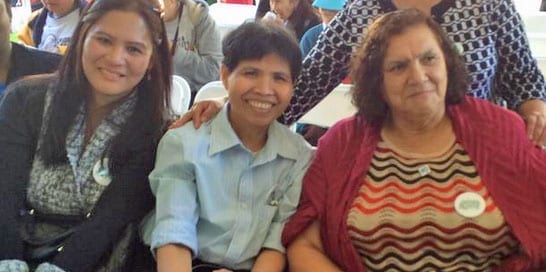Gender-based violence on the job occurs far more often than most people realize, and domestic workers—isolated in individual homes—are especially vulnerable to abuse, said domestic workers, union organizers and experts Wednesday at a panel discussion focusing on women and violence at work.
“They treated us like slaves,” said May Joy Guarizo Salapare, describing her experience as a domestic worker for a family in Saudi Arabia.
When Guarizo arrived in Saudi Arabia from the Philippines, her employer refused for months to let her call her family to let them know she was safe or to contact the labor recruiting agency that arranged her job. Meanwhile, Guarizo and another domestic worker from the Philippines worked every day from 6 a.m. until midnight, when the employer locked them in their room. The employer’s son continually tried to corner Guarizo in the pantry and other areas where he could assault her.
After Guarizo finally managed to contact the labor agency, she was sent home with no money. Only through the kindness of passengers on the plane, could she pay for a taxi from the airport.
Guarizo—one of the panelists at the Gender-Based Violence in the Workplace discussion held at the Solidarity Center in Washington, D.C.—says she is working to ensure that others do not endure the treatment she suffered, conditions all too common for the world’s 52 million domestic workers, most of whom are women. Today she is a member of the Domestic Workers’ Network in Jordan and the United Filipino Workers Association in Jordan.
Guarizo was joined on the panel by Sehamin Irene Dominique Flora Tieu To, an Ivory Coast native and active member of the Coalition of Migrant Workers in Morocco; Bama Athreya, senior specialist for Labor and Employment Rights at the U.S. Agency for International Development (USAID); and Robin Runge, a U.S.-based attorney who specializes in gender-based violence. Lisa McGowan, Solidarity Center senior specialist for gender equality, moderated.
Addressing violence directed at domestic workers is particularly difficult, panelists said, because women are reluctant to come forward for many reasons—including loss of employment, risk of further abuse by the employer or labor recruiter and culturally driven shame about discussing such details in public.
Tieu To, who as a domestic worker was trapped in her employer’s house in Morocco after he took her passport, described herself as “one of the lucky ones.” She was forced to sleep in a room that was a “glorified closet” and was not paid after the first two months’ work, but left without being physically abused. She is now reaching out to other domestic workers in Morocco to bring them into the Coalition of Migrant Workers, where they have access to legal and medical assistance, and hopes to expand the group’s outreach to Moroccan-born domestic workers.
Despite the prevalence of gender-based violence at work, few countries collect such data. “It is shocking how little data we have,” said Athreya. Yet data is essential for changing the prevailing attitude that the problem is limited to a handful of workers, she said.
Speaking from the audience, Marcel Sinzidi Amiyeto, the president of the Collectif des Travailleurs Immigres au Maroc (Coalition of Migrant Workers in Morocco), said it is important to keep in mind how the lack of family-supporting jobs in many countries and economic polices that impoverish people force so many workers to go abroad.
“Sometimes we forget to talk about why people leave their homes,” he said. “Unless we find out how we can solve those root issues, the problems will continue. We must raise awareness in the country of origin.”
Guarizo, Tieu To, Amiyeto, Phobsuk Gasing of the International Domestic Workers Federation and Myrtle Witbooi, general secretary of the South African Domestic Service and Allied Workers Union, participated in a weeklong exchange program in which they met with U.S. domestic workers in California, took part in the United Domestic Workers of America convention in Sacramento and held a roundtable with union organizers at the Solidarity Center in Washington, D.C. All were in the United States as participants on a U.S. Department of State Professional Fellows exchange to examine international models for overcoming the obstacles of reaching and organizing domestic and migrant workers.

